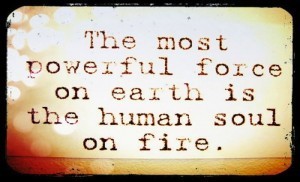What Do I Want
I’m surprised how many Christians, even men and women in leadership, don’t know what they want.
We know what we’re supposed to want – to serve or to lead, as we are female or male (respectively). But when we face doing something apart from the herd of sheep we must figure out WHY, why am I separating from the herd? And this takes self-awareness, which precious few Christians cultivate. So instead, we stall, or even worse, we fill our schedules so thick we cannot think about what we want.
In this summer of spiritual practices, there is one discipline that has taught me to notice what I want, a Christian discipline I had never heard about, but one that has walked me out of dungeon of codependency and into the fields of freedom.
This practice, which St. Ignatius dubbed the examen (see The Spiritual Exercises), was introduced to me by the charismatic Catholic family of Dennis, Sheila and Matthew Linn through their simple, short book Sleeping With Bread: Holding What Gives You Life. St. Ignatius believed God would speak through our deepest feelings and yearnings, what he called “consolation” and “desolation.” Through the examen’s questions (and there are only two) I began to practice self awareness as a way to worship the God who made me on purpose THIS way.
But it’s not just St. Ignatius who believed God wanted our deepest desires and fears. Jesus said, “Blessed are you when you hunger and thirst for righteousness” (Matthew 5:6). David wrote, “My soul longs for you, my flesh yearns for you, in a dry and weary land where there is no water” (Ps 63:1). Jesus appealed to what gave us life when he said to the woman at the well, “But whoever drinks of the water that I will give him shall never thirst; but the water that I will give him will become in him a well of water springing up to eternal life” (John 4:14). Our desires lead us to the way we were made to be.
The Examen, for such an intense name, involved only two simple questions. I ask them of myself in the evening.
1 – For what moment today am I most grateful?
2 – For what moment today am I least grateful?
Already, I have my favorite question. For me, I can much more easily find what makes me grateful than what makes me least grateful. For my husband, he’d prefer starting with his least grateful moment.
Start with the question that feels easiest.
And there are many other ways to ask these same questions. The Linn’s suggest the following adaptations. Choose the one that is easiest for you to identify the answer.
When did I give and receive the most love today?
When did I give and receive the least love today?
When did I feel the most alive today?
When did I most feel life draining out of me?
When today did I have the greatest sense of belonging to myself, others, God and the universe?
When did I have the least sense of belonging?
When was I happiest today?
When was I saddest?
What was today’s high point?
What was today’s low point?
I started practicing the Examen last year, when a friend (thank you Elisabeth M) recommended the book. I had already enjoyed the Linn’s work (Healing Spiritual Abuse and Religious Addiction) but now this book offered a chance to notice more closely who I was made to be. I made surprising and heartening discoveries.
I learned that I slip into codependency like an addict, but that the examen would shine a light into those moments. My codependent moments were always my saddest moments of the day, the times I felt the least sense of belonging. Codependency requires that I distort the truth of who I am in any way to please others, to meet expectations of who I should be or what I should feel. Even the smallest lie can disorient me into forgetting who Jonalyn was made to be. The examen re-calibrates me every night to remember the truth about who I am and what I need.
I learned that I’d rather have a messy house full of people I love than a clean house that is empty of company. Growing up my family prized tidiness so until this year (it took me 34 years!) I have fretted before and after company because of the state of the house. And my husband will tell you, our house was never, ever in any “state” to be worried over.  The examen opened up my least grateful moment when I realized, “I felt the most life draining out of me when I worried that the wine stains on the chair were somehow a reflection on ME. But I didn’t really care that the wine spilled, besides, we all got to work together to get it cleaned up. ” My most grateful moment was seeing all those friends around our table. I realized that fearing what would happen to my house was not a reflection of me, but a reflection of someone else.
The examen opened up my least grateful moment when I realized, “I felt the most life draining out of me when I worried that the wine stains on the chair were somehow a reflection on ME. But I didn’t really care that the wine spilled, besides, we all got to work together to get it cleaned up. ” My most grateful moment was seeing all those friends around our table. I realized that fearing what would happen to my house was not a reflection of me, but a reflection of someone else.
I learned I don’t like sitting with other people’s (or my own) least grateful moment. I want to solve it. But the Examen has taught me that life-draining moments are not always Jonalyn material to solve. They’re material, certainly, but God has work to do without me tidying up.
I learned that patterns emerge of what I want and what I do not want. This practice has helped me realize who my dearest friends are, what I treasured most when I went into surgery last week, what I needed, what I did not want, what makes me come alive, what deadens me, and what God’s sealed orders are for me on this earth.
No small benefit.
A few notes on how to practice the Examen (from Sleeping with Bread)
Before answering the questions, put your hand on your heart and ask Jesus or God as you understand God to bring to your heart the moment today for which you are most grateful. If you could relive one moment, which one would it be? Ask yourself what was said and done in that moment that made it so special. Breathe in the gratitude you felt and receive life again from that moment.
Ask God to bring to your heart the moment today for which you were least able to give and receive love. Ask yourself what was said and done in that moment that made it so difficult. Be with whatever you feel without trying to change or fix it in any way. You may wish to take deep breaths and let God’s love fill you just as you are.
Do practice this with your spouse or children. The examen has the ability to teach children to trust themselves, to know that God is in all reality, not just out there or in church, or theology, but in themselves. It teaches us to trust that we know what gives life and what doesn’t.
Two books I recommend to keep practicing
Sleeping with Bread: Holding What Gives You Life – read this review of how this book changed Camber, one of our fav babysitters and Soulation assistant.
Let Your Life Speak: Listening for the Voice of Vocation by Parker J. Palmer one of the best books for learning to not wear other people’s faces.
Jonalyn Fincher's Blog
- Jonalyn Fincher's profile
- 9 followers



